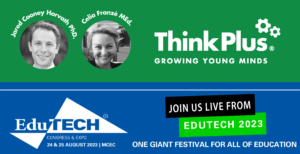The Science of Growing Young Minds by Celia Franzè
Part 2 of 4.
How are Australian schools embracing the science of learning?
Across the landscape of Australian education, emerging evidence-based approaches are promising a revolution in pedagogy. A notable example is the ‘Science of Learning,’ a field synthesising insights from psychology, neuroscience, and education to enhance teaching and learning. An exploration of ThinkPlus, an innovative educational entity, provides us with an insightful journey into how this approach is being integrated into our educational model.
Understanding the Science:
At the heart of this paradigm shift is a profound understanding of cognitive science that forms the bedrock of effective learning strategies. It’s about comprehending the ‘why’ behind each pedagogical technique. For instance, Australian schools, as part of their professional development initiatives, have started offering workshops on cognitive science concepts such as cognitive load theory and spaced repetition. This foundational knowledge equips educators to embed these techniques into their curriculum more effectively.
Continuous Application and Collaboration:
ThinkPlus emphasises the continual application of methods informed by the science of learning. Much like teachers in Victorian schools sharing their tried-and-tested strategies for teaching numeracy, ThinkPlus educators also record their experiences, successes, and challenges, fostering a culture of collective growth and continuous learning.
Identifying Effective Strategies:
An essential step in this journey is the identification of research-backed strategies for broad implementation. Take, for example, the New South Wales Department of Education’s explicit instruction model, a teaching method supported by cognitive science. In a similar vein, ThinkPlus deconstructs chosen strategies into their constituent parts, allowing for more effective, tailored delivery.
The Journaling Approach:
One tactic that has taken root at ThinkPlus is the practice of journaling for bolstering content retention. Mirroring the prominent use of reflective writing exercises across schools in Queensland, these unassessed, concise journal entries composed at the start of the lesson have demonstrated a significant boost in students’ ability to recall information.
Action Research and Learning Sprints (test-run)
Once a strategy is identified, it is ‘test-run’ in the educational setting, a step echoed in the process followed by many schools across Western Australia while adopting new pedagogies. Inevitably, this stage uncovers unforeseen challenges, which are critical to refining the methods and fostering shared goals within the teaching community.
Based on insights from the test-run, the strategy is adapted to better suit the learners’ needs. Reflecting on the journaling strategy, ThinkPlus found it most effective when teachers guided their students in weekly sessions using the student journal.
Collective Teacher Efficacy
Once a strategy is refined and teachers are comfortable with it, it is integrated into the broader curriculum, aligning with the collaborative pedagogical development seen in South Australian schools. The learning journey, the proven method, and the principles behind it are shared with all educators involved, promoting a community of practice that supports understanding and effective delivery of the strategy.
Conclusion:
This shift towards the ‘Science of Learning’ is transformative; accounting for, yet moving soley beyond, the highly effective PEN Principles to encompass education, from a conjecture-based system, to a focus on validated pedagogical methods. By refining our learning experiences based on the proven principles of cognitive science, as demonstrated by ThinkPlus, schools are in a better position to prepare our students for the complexities and challenges of the future. The journey of ThinkPlus represents a microcosm of a broader trend sweeping across Australian schools – a trend fuelled by the promise of what science can bring to the art of teaching and creating future-ready students.
